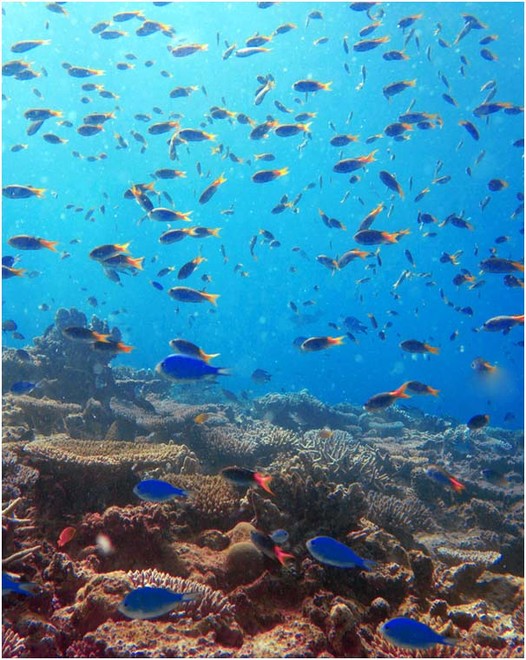Tasmanian marine life summit - ground-breaking data
by Media Services on 23 Nov 2012

The summit will delve deeper than scientists have been able to before. George Roff
Scientists are hoping a two-week workshop on a Tasmanian island will help them break new ground in the understanding of marine life.
International researchers are staying on Maria Island off the south-east coast of Tasmania to collate survey information collected from hundreds of reef divers in 36 countries. Attending the summit are scientists from countries including the US, the Galapagos Islands, Indonesia and Chile.
Rick Stuart-Smith from the Institute of Marine and Antarctic Studies says the information will allow researchers to assess the impact of overfishing, pollution and climate change on a scale never seen before.
'The reef life survey data set is altogether and organised now and it's actually one of the best resources in the world for this sort of information,' he said, adding that there’s a much greater spatial coverage and level of detail that's ever been possible before.
Ed Parnell from the Scripps Institution of Oceanography in the United States says before this study there was no consistent global information on marine life.
'This is a unique opportunity to see who things are going globally. There are some fishery records showing that a lot of species are harder and harder to catch, but in terms of this type of protocol in the shallower reef environments there's not a lot of data from other species at all.'
The 20 international researchers and the 14 UTAS staff members and students will be accommodated in the World Heritage Listed Darlington Probation Station, courtesy of the Tasmania Parks and Wildlife Service. The former convict rooms do not have electricity but the Mess Hall and Chapel will have power and internet facilities.
The workshop, led by Professor Graham Edgar and Dr Rick Stuart-Smith (a 2012 Tasmanian Young Tall Poppy Science Awardee) from the Institute for Marine and Antarctic Studies (IMAS), will be based on the information collected through the Reef Life Survey (RLS) project.
The RLS was developed by Prof Edgar in 2007 through support to UTAS provided by the Australian Government Department of Sustainability, Environment, Water, Population and Communities. It trains and supports committed recreational scuba divers to collect detailed biodiversity data on a scale far greater than possible for scientific dive teams.
'IMAS is proud of its role in nurturing the Reef Life Survey dataset,' the Institute’s Executive Director, Professor Mike Coffin, said today. 'It is massive in its geographic and taxonomic scope, encompassing more than 1800 sites in 36 nations, and covering more than 4000 marine species.'
The workshop itself is 'something of an experiment for IMAS,' he added. 'We are keen to see how it works out, both in terms of scientific productivity and outputs, and also in terms of social interactions and collaborative links established.'
Dr Stuart-Smith says the aim is 'to improve understanding on how the world’s marine life is distributed naturally, and how natural patterns have been affected by human impacts such as overfishing, habitat destruction, pollution, global climate change and species introductions.
'Particular emphasis will be placed on filling gaps needed to better manage the conservation of marine biodiversity, including how managers can improve conservation outcomes when declaring marine protected areas.'
According to Prof Edgar, 'This meeting draws on the efforts of enthusiastic recreational divers who have collected detailed ecological data worldwide, and support from our overseas scientific colleagues.
'We have now been able to establish a dataset on densities of fishes and other marine life that is many times larger than available for previous scientific study, allowing us to answer previously-unsolved questions associated with the great complexity of life in the sea.
'I look forward to seeing what new discoveries eventuate over the next two weeks, and the benefits these bring to management of our seas.'
More at www.reeflifesurvey.com
If you want to link to this article then please use this URL: www.sail-world.com/104028